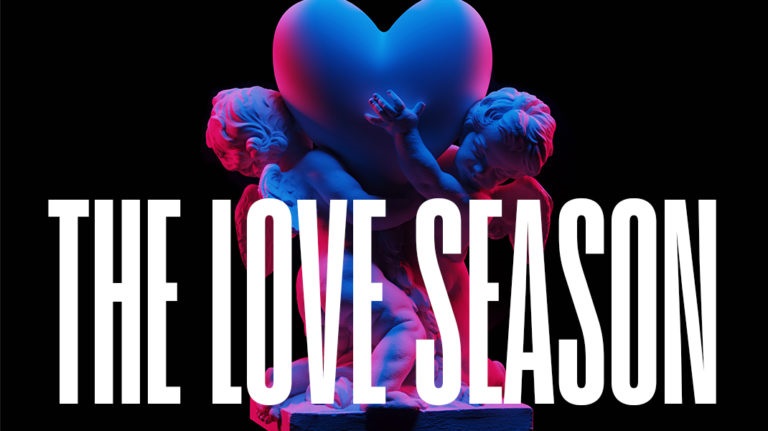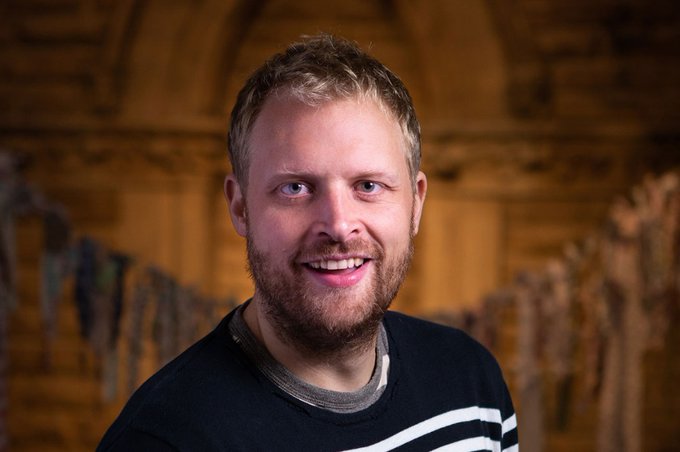
YORK Theatre Royal will re-open tonight after 427 days, but chief executive Tom Bird feared this day might never have come.
Aside from two preview performances of December’s Travelling Pantomime tour, the main house stage has been in Covid-enforced hibernation since March 14’s performance of Alone In Berlin.
In the ensuing months, shorn of 89 per cent of its annual income being generated through selling tickets and associated revenue streams, the Theatre Royal had to cut its permanent staff by one third – seven voluntary redundancies and nine staff made redundant – after extensive consultations against a grim national picture where an estimated 40 per cent of theatre workers have lost jobs over the past 15 months.
Last September too, the Theatre Royal’s divorce was announced from the neighbouring De Grey Rooms, home to the theatre’s leased rehearsal rooms, workshops, offices and below-stairs costume department, as well as weddings, parties, award ceremonies and performances in the glorious ballroom.
Had Tom ever thought that the pandemic might be the final curtain for the Theatre Royal, England’s longest-running theatre outside London? “Yes, as early as last May, I started wondering. I remember it well because the weather was gorgeous, but the outlook was bleak, though it was at that stage that Arts Council England were brilliant, in that they moved very quickly to provide £160 million Emergency Funding to theatres like us,” he recalls.

The Theatre Royal received £196,493 to help to cover costs in the fallow months from last July to September 30. “The ACE grant was about ‘What do you need right now not to collapse?’,” said Tom at the time.
“But when 89 per cent of your income revolves around ticket sales, you’re looking at that situation thinking, ‘that’s 89 per cent of our revenue gone, a turnover of £4.5 million; what business survives that?’.”
What’s more, Tom and the theatre faced the problem of running an old, if recently refurbished, building that is both huge and hard to heat, “so much so that it costs £475,000 a year just to keep it open, without staffing, to cover heating, lighting, water and safety,” he reveals.
“At that point, we didn’t know that Culture Recovery Funding would be made available by the Government, though there was a lot of noise, and we didn’t know if the pantomime [Cinderella, in the Theatre Royal’s first collaboration with Evolution Productions] could go ahead.
“What we did was to get brave at that point, making big decisions, giving up the lease of De Grey House and the De Grey Rooms, going back into our old offices in the gorgeous, ramshackle Tate Wilkinson House.
“Then there’s the decision you never want to have to make: having to lose staff, and that decision still haunts me. But in a way, the need to make savings was pretty black and white; it wasn’t a case of looking to be a bit more efficient. We had to take steps now, and last summer was pretty tough.”
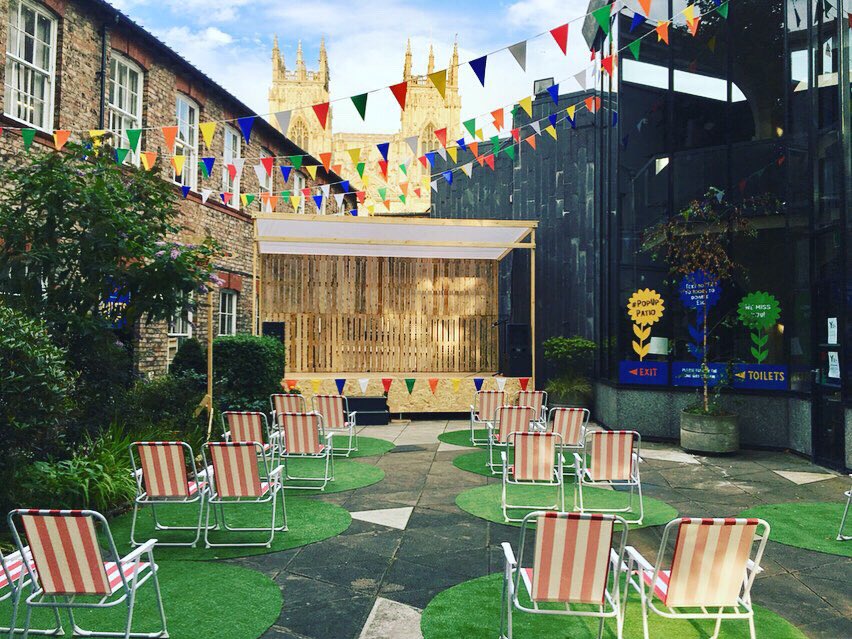
A Pop Up On The Patio festival season on the theatre terracing ran from August 14 to 29, a positive step in showcasing York and Yorkshire talent, but through the huge glass panes of the Theatre Royal could be seen the dormant foyer, box office and closed doorways to the main house and Studio: out of reach and shrouded in uncertainty.
Once the £1.57 billion Culture Recovery Fund was announced, the Theatre Royal was awarded £230,000 to assist the theatre until March 31, but the pandemic’s grip put paid to any chance of Cinderella going to the ball at the Theatre Royal.
“What picked us up was deciding to do the Travelling Pantomime that we took round York’s wards: it gave us something to focus on, not just thinking ‘is the Theatre Royal going to survive?’,” says Tom.
“It energised us all, and it was such a great show to do, but the truth is, a year ago, I couldn’t have looked you in the eye and said, ‘this is going to be OK’.
“We didn’t even know what was going to happen through that year ahead, but I have to say that the Yorkshire producing theatres have been brilliant. York, Hull [Hull Truck], Leeds [Playhouse], Scarborough [Stephen Joseph Theatre] and Sheffield [Sheffield Theatres] have got together each week on Zoom, which has been a really good case of peers supporting each other…
“…and we are where we are now, reopening to coincide with Step 3 of the roadmap. Love is in the air at the Theatre Royal!”
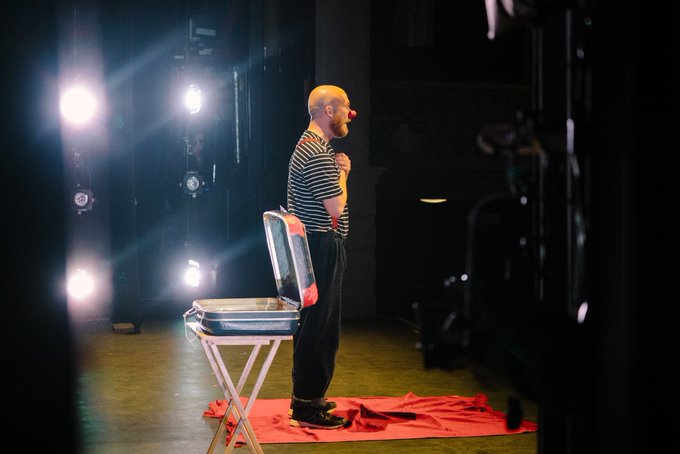
Tom is referring to The Love Season, already trailered in CharlesHutchPress [April 29 2021], that opens with Love Bites: two nights of two nights of letters from the heart tonight and tomorrow at 8pm that have both sold out.
The Love Season should have opened on St Valentine’s Day, February 14, but Lockdown 3 put yet another red line through diary plans. However, a second round of the Cultural Recovering Fund grants has put a £324,289 spring in the Theatre Royal’s step, coupled with the third stage of lockdown loosening from today.
Love Bites will turn the spotlight on the creativity of artists from in and around York, whether poets, performers, singers, dancers or digital artists, who have been commissioned to write love letters celebrating the return to live performances after the easing of the Government’s pandemic restrictions.
Introduced by Look North alumnus Harry Gration, Love Bites will explore the idea of love letters, dedicated to people, places, things, actions, occupations and more besides in five-minute specially commissioned bite-sized chunks.
The Love Season’s focus on human connection, the live experience and a sense of togetherness will embrace solo shows by stage and screen luminary Ralph Fiennes and Coronation Street star Julie Hesmondhalgh (The Greatest Play In The History Of The World…); a new Ben Brown political drama about writer Graham Greene and spy Kim Philby, A Splinter Of Ice, and Swedish playwright August Strindberg’s Miss Julie, transposed to 1940s’ Hong Kong by writer Amy Ng and director Dadiow Lin.
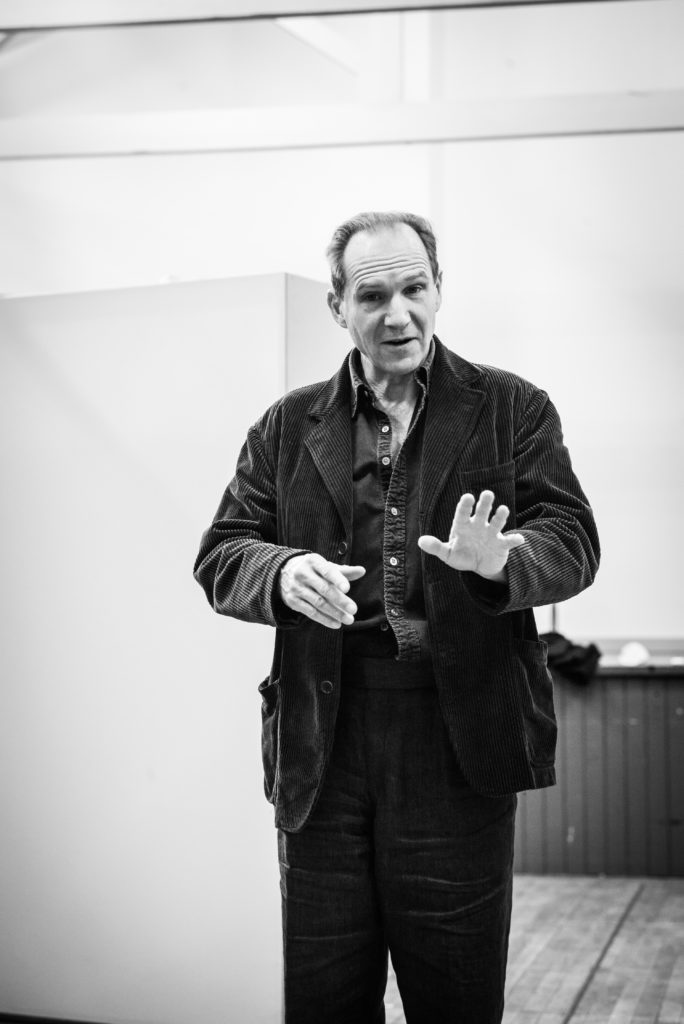
The number one talking point is Ralph Fiennes’s Theatre Royal debut, in six performances from July 26 to 31, directing himself in the world-premiere tour of T S Eliot’s Four Quartets: a solo theatre adaptation of Burnt Norton, East Coker, The Dry Salvages and Little Giddings, a set of poems first published together in 1943 on the themes of time, nature and the elements, faith and spirituality, war and mortality.
Tom says: “Ralph is rehearsing in London, opening at the Theatre Royal, Bath, from May 25 and then touring. We’re so chuffed to have Ralph coming to York. We can’t believe it!
“We’re thrilled that Ralph’s show became a possibility for us, and it’s a huge credit to him to recognise the need to support theatre around the country at this time. Let’s say it, it’s rare for an actor of his profile and standing to do a regional tour, but he’s seen that he can help to save some incredibly important producing houses, like this one, by doing a tour – and it’s not an act of charity; it’s an important and really exciting piece of work.”
Performances in The Love Season will be presented to socially distanced audiences, adhering to the latest Government and industry Covid-19 guidelines to ensure the safety of staff and audiences with a reduced capacity of 344, but should Step 4 of the roadmap roll-out go ahead as planned on June 21, there is scope for more seats to go on sale for shows later in the season. Over to you, Mr Johnson and the Indian Variant fly in the ointment.
For full details of The Love Season, go to: yorktheatreroyal.co.uk. Tickets can be booked at yorktheatreroyal.co.uk; on 01904 623568, Monday to Saturday, 12 noon to 3pm, and in person, Thursday to Saturday, 12 noon to 3pm.
